die verliebte firma.
High amid the snowy peaks, a couple in evening clothes sing of Venice,
it’s a movie being shot, “anyone for tennis?”
Back at the villa, the songwriters are arguing. “Sonnenschein hat aber kein sex appeal!”
Production meeting, Venice must be like a dream, a breath of magic, a
fairy tale, St. Mark’s Square, with pigeons, romantic, the Doge’s
Palace, optical, acoustic, not too dear, “this isn’t a production
meeting, it’s a madhouse!”
Ken Russell takes great stock of this, especially in The Boy Friend
(George Cukor in Two-Faced Woman), and of course François Truffaut...
The Company in
Love.
At RKO, standing in for Four Star Studios, David Butler takes it in hand as That’s
Right—You’re Wrong.
Wheeler and Woolsey for the soon harmonious tunesmiths (they are
contagious).
Who is the real auteur of a film? Everybody
but the assistant director. Talented, quite talented,
very talented, too talented, “tomorrow we’ll see if she’s
talented or not.”
George Marshall in The Goldwyn Follies, Vittorio
De Sica in Le Streghe for the dream.
The dream of stardom, the reality of film production. “Meshugge!” Michelangelo Antonioni in La Signora senza camilie, David Butler in It’s a Great Feeling. One beautiful shot of Berlin, a pan left across traffic at the Bahnhof Zoo.
Die verkaufte Braut
The Bartered
Bride, treated with the utmost
brilliance in the manner of a film musical, perfected at every turn.
One of those
films deeply observed by directors such as Bergman, Fellini and Eastwood, or
surmised by them, with that traveling circus so notable in many productions. The inspiration may have come from a simple wish to find
an adequate staging cinematically expressed. Like
Chaplin’s A Woman of Paris, it omits all the inessential machinery
of a film and is consequently very short, an hour and a quarter, all speed,
hysterically funny comedy, aplomb, terseness and suggestion.
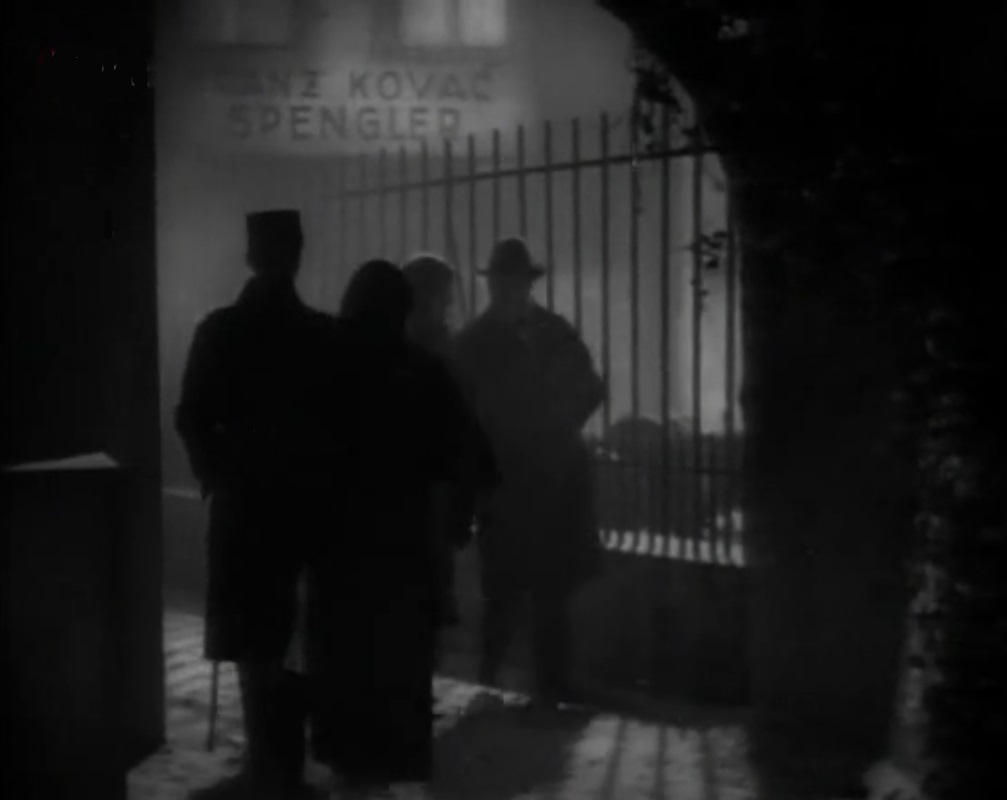
The Leutnant and the Baronin, the lieutenant and the cellist’s daughter,
the equation is worked out over The
Abduction from the Seraglio.
An affair of honor, the occasion is past, the Baron
will have satisfaction.
“I think he meant us.”
A commonplace incident that ends very badly, like Madame de... (the Leutnant has a second named Lensky) and nearly Le Plaisir. Hitchcock remembers
it in Notorious, “he’s
looking all the time, he’s watching us,” Bergman in Smiles of a Summer Night, Menzel in Closely
Watched Trains, Nichols in The
Graduate, Bresson in Une Femme douce,
Russell in The Devils.
“In view of political conditions,” but
Truffaut has the story. “His most famous film
and the one he himself preferred... when Ophuls fled Germany at the advent of
the Nazis, his name disappeared from the credits of Liebelei. When he went back a year and a half ago, he had the
opportunity to see the film again, after twenty-five years. Before
the showing, a local celebrity rose to explain that there was nothing to be
proud of in the doctored list of credits. There was a
moment of silence, then the film was shown and
applauded at length.”
“Das hungrigsten Mädchen der Gegenwart.” The
Baron’s mien is aped by Olivier in The Prince and the Showgirl,
and there is the duel in The Three
Sisters. Truffaut says the ending of Madame de... “is a
remake pure and simple.”
“...und ihr Mann hat ihm umgebracht.”
“Every
shot that isn’t fired in self-defense is murder,” exclaims the
other second, with a vehemence remembered by Kubrick in Paths of Glory.
Frank S. Nugent of the New York Times, “so mellow, radiant and tender a picture.” Variety,
“the picture might be almost without flaw, except for a sequence quite
unnecessarily melodramatic involving one of the leading characters, just for
the sake of introducing an anti-duel argument.” Time Out, “the film may be a
little slow and ragged at times, but its final emotional power is undeniably
immense.” Leonard Maltin,
“haunting, exquisitely filmed”. Dave Kehr (Chicago Reader),
“one of the most original directors ever to guide a camera.” Halliwell’s
Film Guide, “semi-classic romantic novelette.”
Lachende Erben
Thrice a mensch, the late vintner Bockelmann,
“finest champagne on the Rhine.” The
family want mineral water.
The advertising and sales manager inherits if he
can stay off the stuff for a month, also the
rival’s daughter is an interest.
Mordaunt Hall (New
York Times), “a highly entertaining comedy... the actors are all
excellent, the photography and sound reproduction are clear, the music and
jokes are pleasing and the views of the Rhine and the vineyards are
delightful.”
There is a motive for the teetotaling
onkel with
the tipsy frau to ply the young man
with drink.
Blake Edwards inherits the style, from the
nephew’s entrance with the family dog, slowly crossing a room full of
disagreeable relations, Laughing Heirs
it’s called in English (Hitchcock has a variant of this scene in The Birds).
The recorded will, “if God wants to punish
someone, He gives him the likes of you for relatives.”
“Incredible,” says Uncle Justus. “Even now, when he’s dead, he has to annoy
us.”
By steamer on the Rhine to Waldesruh
Sanatorium to sleep out the stipulation, with the competition in pursuit, and
that’s where the daughter of rival Stumm pours
out sekt to
Justus.
According to the Deutsches
Filminstitut, “eine turbulente Komödie...”
La Signora di tutti
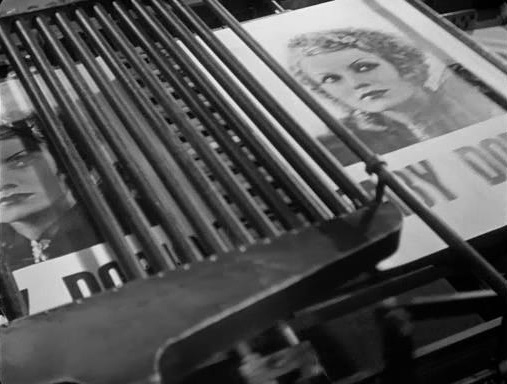
Life of the film star (“tutta la sua vita”) recounted on the
operating table (“nel sonno della narcosi”) after
an attempt at suicide (“in una
vertigine di sogno”).
She went to school, a professore died for love of her,
“a dangerous girl”, her bald autocrat father took her in hand,
there is an ailing Countess of years and a gadabout Count, homme d’affaires, they have a son, a
beard in the business.
Ophuls in Rome, first-rate on childhood “assemblies”,
the rest deadpan as you please, in advance of the postwar Italian cinema and
akin to Polanski’s Che? amongst other
films.
Welles that great student of the cinema surely knew
it, Woody Allen certainly reveals a knowledge of it, on the other hand Ophuls
comprehends John Ford on printing the legend, Gaby Doriot’s
Paris agent tells the world in a microphone not this story (“a novel or a
film”) but cheerful nonsense of a mother in Montmartre,
giovinezza e fortuna...
furthermore Ophuls clarifies the strand of thought from Jean Renoir (La Chienne) to Vincent Sherman (Mr. Skeffington) and Fritz Lang (Scarlet Street) and William Wyler (Carrie).
Truffaut has her “aging”, the suicide
note comes up on the screen just before the end, placing the work with Letter from an Unknown Woman and Madame de... The structure suggests
Joyce’s “Cave of the Winds” (Ulysses).
H.T.S. of the New
York Times, “this commonplace lesson.” Jack
Riley (The Independent), “Ophuls’ tragic melodrama of when lovely woman
stoops to folly remains as elegant today as it was on its release in 1934.”
Time Out, “commerce, industry and high finance are viewed with sharp
irony throughout, but the melodrama centres on a seductive ambiguity: is Gaby a
victim of those around her, or their willing accomplice?”
Dave Kehr (Chicago Reader), “large-scale, operatic effects and aggressively
experimental style.” TV Guide, “a moving and beautifully
made melodrama.” Hal Erickson (All Movie Guide), “modern audiences may have trouble keeping a straight face”.
“Once in a while the Cinémathèque Française
shows us the very lovely film which followed Liebelei, La Signora di Tutti,
shot in 1934 in Italy, and based on a serial novel that oddly anticipates Lola Montès.” (François
Truffaut)
Divine
The town mouse and the country mouse on the Paris
stage.
The housecleaning is an effect emulated by Lang in Clash by Night.
“Of the half dozen films that Ophuls made in
France before the war, Divine is
perhaps the best... he offers us his first inside portrait of the backstage world. If we are already made to think about Lola Montès, it’s...” (Truffaut)
Plenty of virtuosity, the first look backstage is a
circular pan right arranged with the action to give the effect of a tracking
shot, which duly follows from the stage in rehearsal to the harried director in
the stalls.
« le premier scénario écrit directement pour l’écran et dialogué par
Colette »
From the literal plow to the stars, anyway the
chorus.
“That, an artiste? It
never goes out, never receives even a cat. For me,
that’s no artiste.” This is observed by,
as Mel Brooks would say, the conci-urge.
A snowstorm of cocaine, the police are called in.
“We’re blasé, but the girl and the snake, that was art.” Various sexes behind the scenes (cf. Winner’s The Sentinel). The gag borrowed by Russell
for The Insatiable Mrs. Kirsch is a
baby in the baggage (he also remembers his Herod in Salome’s Last Dance from Ophuls). The
Baudelairean image of a starry coronet and a bottle cascading down the stairs,
amidst a sterling apperception of stage fright pudoris causa, a scene oddly remembered in
Buñuel’s Susana from another
angle.
How a dancer gets her dinner, sometimes. Paris primroses, elsewhere cowslips.
The “catastrophe”
pronounced by the producer (a model for Huston’s S.S. Nyanga skipper) is a reminder of
Nosseck’s Le Roi
des Champs-Élysées with Buster Keaton the previous year, and eventually
works its way into Wyler’s Funny
Girl.
The title is simply the nom de guerre instantaneously bestowed upon the country mouse with
the round-the-corner name.
The pure Ophuls as the opium tray tumbles and the
camera tracks far this way and that for an escape from the police, “us
again.” Blackmail, smuggling, “all for 40
francs a day.” The cure for that when it rains
in Paris is “a walk in the country,” a fire at the
Empyrean-Montmartre. “A dictatorship is when
police are in the dressing rooms and artistes are in the hall.” Divine? “Very nice
and decent. You don’t think that’s odd? You don’t know the music hall...”
Farm girl most assuredly gets farm boy (he brings
the milk from his own dairy, The Winged Cow), an Eden production...
Valse Brillante
Paris before the war, Alexander Brailowsky and the
“blocks of sound” Nabokov cites somewhere.
La Tendre Ennemie
The woman who can neither be lived with nor without,
the secret of her success, remedy and cure.
Three ghosts at the engagement of her daughter, the
husband she ought not to have married, the lover she
took in despite, the beloved she forsook.
Better still, a straightforward surrealism before
Welles, manifesting all the permutations one by one in order.
komedie om geld
Bank messengers and company directors have the same
lesson to learn, money comes home like the dog sold off on a fine sunny day to
a placid couple at a café table outdoors, fishing is altogether better sport,
take it all in all.
Exquisitely constructed with Ophüls’
showman prominent, a prime Dutch comedy akin to Frank Capra (Mr. Deeds Goes
to Town, It’s a Wonderful Life) and René Clair (À Nous la liberté) and Zoltan Korda (Cash, If I Were Rich,
For Love or Money).
Kohana
inspiré de
Yoshiwara
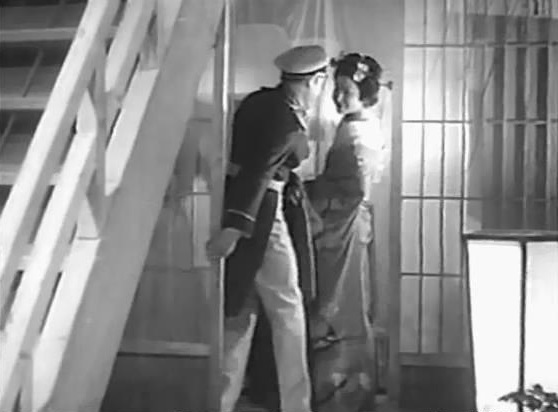
“En 1860 à l’époque où les ports du Japon commençaient à peine à
s’ouvrir aux navires venus de l’étranger, le Yoshiwara
était le quartier des courtisanes et des maisons de thé.”
To restore the family fortunes, repair a
father’s dishonor, and let the young brother wear a sword.
The coolie and push-push man, a Fragonard with a brush,
who holds her in adoration. The title is her name, a
virgin geisha in the place usually given for it, by Truffaut for example, who
tells us Ophuls “didn’t much like” Yoshiwara with its Mizoguchi or Kurosawa settings and costumes photographed by
Schufftan at Joinville-le-Pont
(Studios Pathé). The Russian
navy...
If one had money, from a cockfight or a commission,
a desperate wretch or an accustomed officer. A secret
mission in the European quarter.
Ophuls on the epoch preceding the Russo-Japanese
War, at the very start of the Second World War, a squabble over a doxy.
A kind of tragedie om geld, Michiko Tanaka, Pierre Richard-Willm, Sessue Hayakawa.
Andrew Sarris (The
American Cinema), “even when he is most bitter, he never descends to
caricature. His humor is never malicious, his irony
never destructive. Like Renoir, he was one of the
first genuinely international directors, the kind of artist who did not slur
over national differences in the name of a spurious universality, but who
defined national differences as functions of a larger unity.”
Hal Erickson (All
Movie Guide), “bit of elegant esoterica”.
Werther
d’après
Goethe
The poet who became a referendary
because “justice is as hard to obtain as a publisher.”
Rousseau in the tyrannical hinterlands, best kept
under lock and key for safety’s sake.
A song from the Thirty Years War, composed by a
Swede. “What he sought—tempo and
sweep—was so fragile and yet so precise that it had to be sheltered in a
disproportionately huge wrapping, like a precious jewel enclosed in fifteen
cases, each one large enough to contain the preceding one.”
(Truffaut)
And so die ferne Geliebte (not
“too late” but “too soon”, he
avers) marries the Palais de Justice and he wishes
himself dead in various ways (the bell-tower gag goes into Welles’ The Stranger).
Truffaut has someone else who won’t leave his
room until...
The very theme of Letter From An Unknown Woman.
Sans lendemain
Certainly there’s no future in it, as the
title says, shortly before the fall of France.
A curious resemblance to Curtiz’ Casablanca
is to be noted.
From an American perspective (Canadian), la
femme has been lost to a hoodlum, sunk in social status, and only makes her
lot worse by endeavoring to keep up appearances.
Her young son is taken into safety, anyway.
After La Tendre Ennemie, “Ophuls made Yoshiwara,
which he didn’t much like, Le Roman de Werther (Werther)
which he thought OK, Sans Lendemain (Without Tomorrow) which he
liked a little more, and in 1939, De Mayerling à Sarajevo (Mayerling),
which he finished in uniform, having been mobilized into the Algerian
infantry” (François Truffaut).
The ending is quite like that of Hitchcock’s Foreign
Correspondent, an international call, a certain something disappearing.
De Mayerling à
Sarajevo
During and after the war various analyses were made
of the national character, Ophuls understands the suicide and extinction in
quite another light, not “historical” but
“well-studied”. There are certain
countries where one can be happy and free, “France, for instance.” A left-handed marriage, for the good of the State.
The Czech countess and the Crown Prince “d’une actualité saisissante.” Furthermore,
“Project for a United States of Austria.” At
the start of the Second World War, the incident that provoked the First, a
“pretext”. Ophuls acknowledges the Second
Thirty Years War (1914-1945) as having a halt and a resumption, this time to be
definitively concluded “in peace and liberty.”
Bosley Crowther of the New York Times was not prepared to follow the argument, not at all,
“no sense of fulfillment or poetic exaltation”, as Mayerling to Sarajevo at the end of
October, 1940.
The Exile
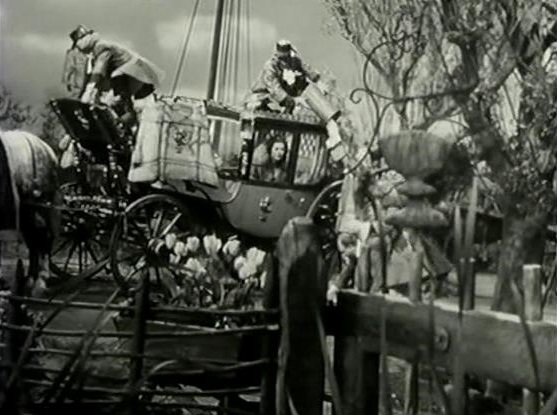
Opuls in Hollywood
like Charles II in Holland, Roundheads pursuing, script and production by his
star, Fairbanks, Jr. A sound stage for a seaport, a
camera and a crane, “why, I remember in Paris some years ago
there—there were two girls...”
“By all the Scottish saints!
...oh, it’s the way the world wags, it’s a long
story.”
A tour de
force of this magnitude and eloquence draws on such things as
Olivier’s Henry V and has
implications ten, twenty or thirty years later, in Richard Lester’s
Musketeers, for example.
A seaport, a canal, a farm, an inn... Dieterle’s Scarlet
Dawn (also with Fairbanks) is a notable structural precedent, Harold
Young’s The Scarlet Pimpernel
another.
A.W. of the New
York Times, “an ambling tale.” Leonard Maltin, “OK
swashbuckler”. TV Guide, “despite a strong supporting cast and an
interesting concept, the film is dull.” Halliwell’s Film Guide,
“curious, talkative”.
The countess in her bath is remembered by Roger
Vadim for Barbarella.
“An excellent film” (Truffaut).
A tulip farm, windmill in the distance.
“The roast beef of old England! Or—or is it some commoner smell?”
One Dick Pinner, itinerant actor. “Is your sight so distorted that in this poor craven
clown you see a king?” Cf. Ford’s My Darling
Clementine.
Fee-fi-fo-fum, I smell the blood of an Englishman! A pan right round the landscape, the windmill
to hide in, cf. Hitchcock’s Foreign Correspondent.
The issue, “God made men free, to live as they please!” Admiring the flowers, “oh, how
beautiful!”
“But have you seen how beautiful the fleet is
at anchor?” The
Specter of the Rose, the return of the king.
Letter From An Unknown Woman
Pound has the
mummy’s soul lament his immurement, Ophuls takes the part of a musician
and poltroon who wastes his life in the vain exercise of his talent on the
reproduction of masterpieces such as Liszt’s “Un Sospiro”,
the fame and glory accruing to him fail, he reads a letter late at night before
a duel he plans to avoid, the writer tells of her admiration over many years,
reminds him of their affair, informs him of their son and now lies dying of
typhus. At dawn he goes to duel with the man she
married, a postscript to the letter further informs its reader that the author
has died. Before entering a carriage for the dueling
ground, the musician has a vision of the girl as he knew her, peeking around a
door.
Wellman’s The
Ox-Bow Incident predates this letter. St.
Paul’s unknown god of Athens is first suggested and later named. The emanation of the soul is from Blake.
Pound’s lines (“The Tomb at Akr Çaar”) are set in
quotation marks and begin,
|
I
am thy soul, Nikoptis. I
have watched These
five millenia and thy dead eyes Moved
not, nor ever answer my desire, And
thy light limbs, wherethrough I leapt aflame, Burn
not with me nor any saffron thing. See,
the light grass sprang up to pillow thee, And
kissed thee with a myriad grassy tongues: But
not thou me. I
have read out the gold upon the wall, And
wearied out my thought upon the signs, And
there is no new thing in all this place. I
have been kind. See, I have left the jars unsealed, Lest
thou shouldst wake and whimper for thy wine. And all thy robes I have kept
smooth on thee. |
“Incredibly
beautiful” (Truffaut).
Caught
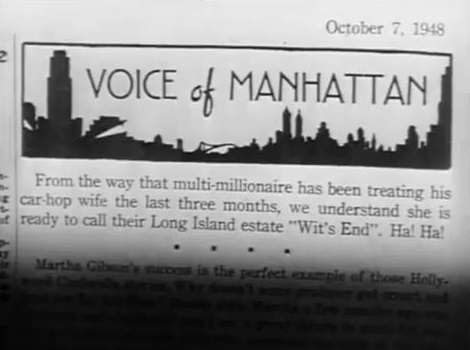
Opuls in Hollywood. “Wally
sign his contract with Metro yet?”
“No, not
yet.”
“Come
along, darling, better have the old one glazed.”
The formal
partnership describes the structure, “he’s an obstetrician,
I’m a pediatrician. He brings children into the world, I try to keep them here.”
Cf.
Kazan’s The Last Tycoon. The title is easily explained, from Hitchcock’s Lifeboat. A certain charm school in Los Angeles, a New York millionaire,
a certain homage to Orson Welles (Citizen
Kane) showing the progression to Roman Polanski (Rosemary’s Baby).
Jean-Luc Godard, “Max’s best American
film... as for the technique, it is already Le
Plaisir.”
Bosley Crowther of the New
York Times, “a silly film”. Variety, “an out-and-out soap
opera on film”. Ottawa Citizen,
“another of Hollywood’s feeble attempts at psychology”. Time Out Film Guide, “a key American
melodrama”. Halliwell’s Film Guide,
“pretentious film noir”.
The Sydney Morning Herald’s reviewer
considered “the ‘moral’” overdrawn. Pauline
Kael at The New Yorker reflected that it might really have happened.
The Reckless Moment
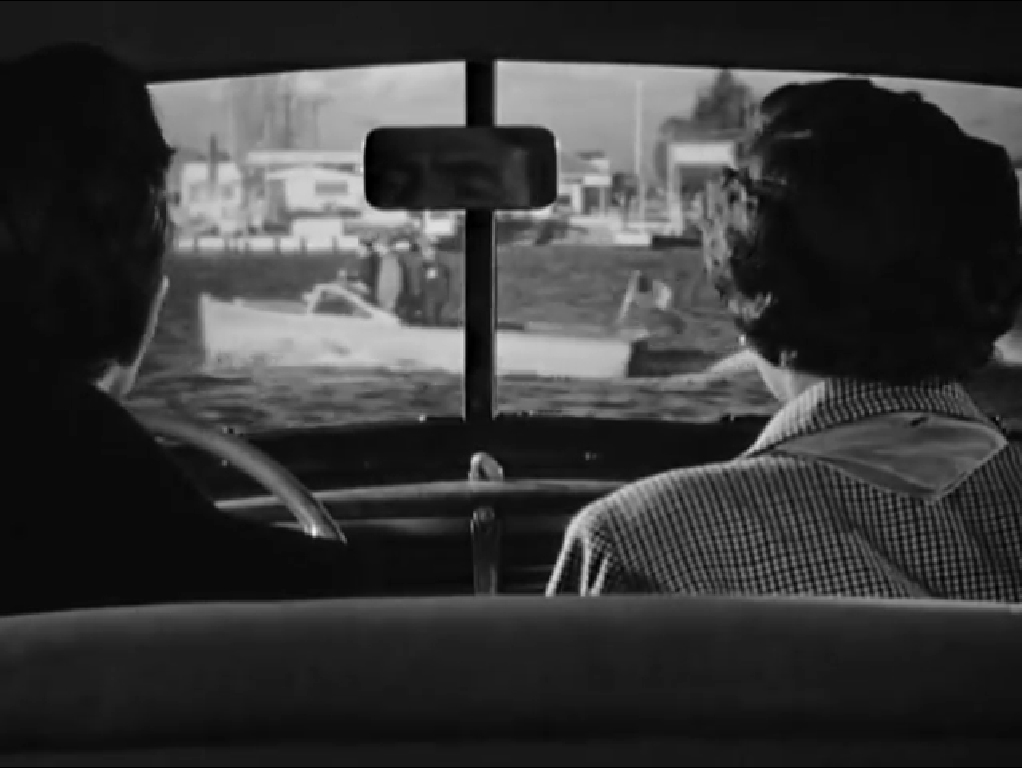
“Everyone has a mother like me, you probably had one, too.”
They’re
either too young or too old on the home front, and a “beast” to be
dealt with.
“Berlin?...
they’ve done without that bridge over there for four years, I should
think they could do without it for two weeks.” The
Irish blackmailer, a nonsmoker with a vengeance, oddly echoed in Lumet’s Dog Day Afternoon and magnified in
Goldstone’s Rollercoaster.
The basis of this
is evidently Hitchcock’s Blackmail, and as ever Hitchcock repays,
in “Wet Saturday” for Alfred Hitchcock Presents, making
rather a hash of the critics from a certain angle (cf. Wyler’s Mrs.
Miniver), to say nothing of The Birds.
Again a portion
of debt to Welles (The Stranger) by
way of homage or acknowledgement. “We’re
all involved with each other, one way or another. You
have your family, I have my Nagel.” J. Lee
Thompson takes up the note in Cape Fear,
Terence Young in Wait Until Dark.
The surrealist
mystery of Balboa. “You know this lady’s
not in your class, Martin.” Household accounts,
a bite out of the budget (cf.
Blystone’s Great Guy).
“Donnelly
might have been willing to make some kind of deal with you, but not me. I don’t care about your daughter, your son, your
husband, or anybody else... this is a business proposition with me, and I
don’t leave this place until I have that money in my hand.”
The elusive key
to this great work is given in Casque d’Or (dir. Jacques Becker).
Andrew Sarris (The American Cinema), “a perceptive
vision of... the obsessive absorption with family at the expense of society”.
Bosley Crowther of the New York Times, “a feeble and listless drama
with a shamelessly callous attitude”. Variety, “a tense
melodrama”. Geoff Andrew (Time Out Film Guide), “a subtle, subversive
critique of American ambitions and class-structures”. Halliwell’s
Film Guide,
“uninteresting melodrama”.
La Ronde
Picasso’s
merry-go-round, the full panoply of experience, “Max Ophuls’ first
European chore in 15 years,” Variety says, “the plethora of
situations making the pic ponderous in its present state.”
Variety would have less of it, though Resnais more than
doubled its length for Smoking/No smoking. “It goes on and on, but
that is the basic format of the yarn.”
Godard à vingt
ans had no use for it either (Le Plaisir heads his list of the Best
French Films since the Liberation).
A succession of
images, say rather a modulation.
Le Plaisir
The old coot who
wears a mask of youth at the dance.
The whores who
close up shop for the day to attend the madam’s niece’s first
communion.
The painter who
wins a model and keeps her after all.
Crowther was
especially struck by the middle piece, which he saw last (Ustinov as
Maupassant). The first was “talkative”, the third
“sketchy”.
It begins with an
ineffable mystery, continues in the grand suite of French art, and ends in
sublimity, talked about.
There should be
an influence discernible on other directors, perhaps Rohmer, certainly Polanski
(The Tenant).
Madame de...
The sparkling
primogeniture of the written moment gives this key, “coincidence is
extraordinary because it’s natural,” merely to say the
extraordinary coincidences of plot have a straightforward understanding.
The simplest sort
of tallying allows a direct alignment of the film with Renoir’s Le
Carrosse d’or, following on De Sica’s somewhat more general Miracolo
a Milano, the point being a certain division of interest between the church
and the state. This rational surd goes so far as to find an effective remake in
Michael Anderson’s The Shoes of the Fisherman.
There is much the
same line of logic as in La Ronde, a sequence of thought that begins
before the film with the Count’s mistress. He is a General, the Countess
receives from a him a gift of earrings. In the famous opening scene, the camera
looks over her shoulder as she surveys her boudoir for something to sell, not
her furs nor her wedding jewelry, something she doesn’t like, the
earrings.
The jeweler who
sold them to the Count buys them from the Countess and brings them to the Count,
who buys them again. The Countess feigns to lose them at the Opera,
Gluck’s Orpheus and Eurydice is heard. Ophuls is the poet of
squeaking doors as the Count discreetly comes and goes in vain search,
staircases are not his only forte. The newspaper reports a robbery, then the
jeweler arrives.
The Count sees
his mistress off to Constantinople, letting her go is as good as leaving her,
she remarks. The earrings are a parting souvenir, she sells them to a shop
where Fabrizio Donati, a diplomat, buys them on a whim.
At Basel, Donati
meets the Countess, an affair begins, she treasures the earrings he gives her.
It all ends in a duel and an echo of Liebelei, Donati presumably killed,
the Countess’s weak heart failing nearby, the earrings in a glass case devoted
to her patron saint for Donati’s protection.
The elements of
the triangle are Charles Boyer’s disastrous mastery, Danielle
Darrieux’s thoughtful distraction, and Vittorio
de Sica’s helpless calm.
“No one
noticed that Max Ophuls had adapted Louise de Vilmorin’s
short story to make it Liebelei’s
mate” (Truffaut).
Lola Montès
This derives from
the circumstance described by Mallarmé in “The Future Phenomenon”,
namely “an age that outlives beauty”.
But there is the
Showman of Things Past (Mammoth Circus) in his house of canvas.
“A poem
worth an untold fortune” (Truffaut).